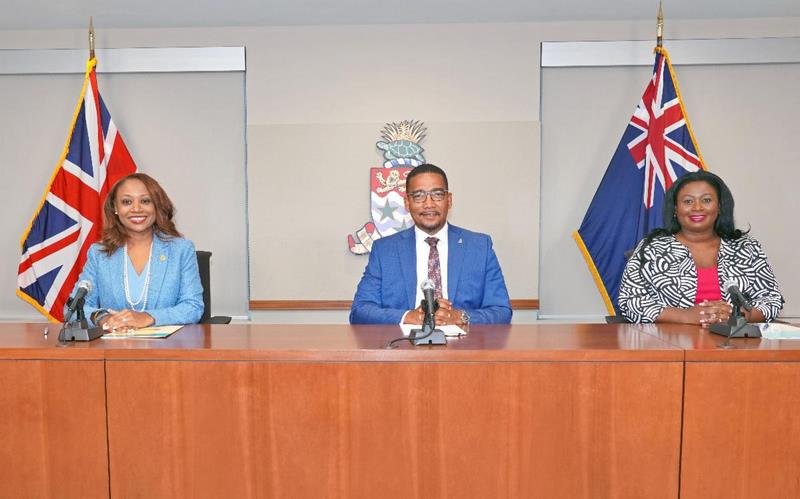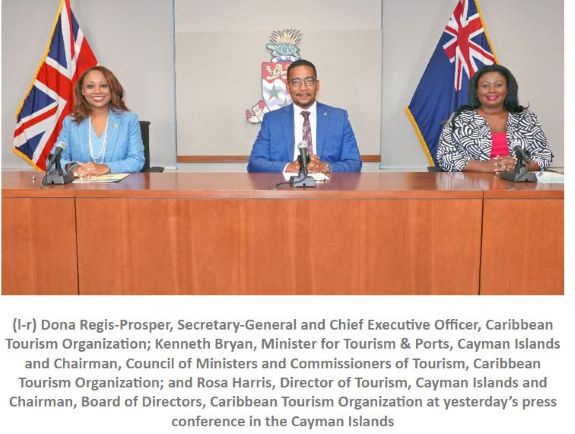CTO’s New Secretary General Unveils Vision for Regional Tourism
In a recent press briefing in the Cayman Islands, Dona Regis-Prosper, the new Secretary General and CEO of the Caribbean Tourism Organization (CTO), shared her vision for regional tourism development. With a focus on strategic direction and collaboration, Regis-Prosper aims to leverage the potential of the Caribbean brand to benefit the people of the region. She expressed her commitment to listening to the challenges faced by each member and working towards solutions that will have a positive impact on both national and regional levels. Regis-Prosper’s leadership, supported by the CTO team, is set to shape a prosperous future for Caribbean tourism.

CTO’s New Secretary General’s Role
Dona Regis-Prosper, the newly appointed Secretary General and CEO of the Caribbean Tourism Organization (CTO), has a significant role in leading and guiding the organization. As the Secretary General, she is responsible for providing strategic direction and leadership to the CTO staff. Her role involves collaborating with member countries and territories, as well as working closely with partners and stakeholders to advance the mission of the organization. With her extensive experience in the tourism industry and her passion for the Caribbean region, Regis-Prosper is well-equipped to fulfill her duties and make a positive impact on the tourism sector.
Role and responsibilities of the Secretary General
The Secretary General of the CTO plays a crucial role in the organization. Their responsibilities include developing and implementing strategies to promote tourism and enhance the region’s competitiveness. They also oversee the coordination of activities among member countries and territories and ensure effective communication and collaboration. The Secretary General represents the CTO at various international forums and meetings, advocating for the interests of the Caribbean region. Additionally, they are responsible for managing the day-to-day operations of the organization and fostering partnerships with other stakeholders.
Expectations and Vision for the future
As the new Secretary General, Dona Regis-Prosper has set forth her expectations and vision for the future of regional tourism. She envisions leveraging the Caribbean brand to unlock the region’s immense tourism potential. Regis-Prosper aims to collaborate closely with all members of the CTO to grow the tourism industry in the region. She plans to listen to the challenges faced by each member and develop workable solutions that benefit both national and regional interests. With her leadership, the CTO aims to implement strategies that will maximize the benefits of tourism for the people of the Caribbean region.
A Brief about the New Secretary General – Dona Regis-Prosper
Dona Regis-Prosper brings a wealth of experience and expertise to her role as the Secretary General of the CTO. Having worked in the tourism industry for many years, she has a deep understanding of the challenges and opportunities in the Caribbean region. Regis-Prosper is known for her commitment to collaboration and stakeholder engagement. Her leadership skills and passion for tourism make her an ideal choice to lead the organization and drive the development of regional tourism. With her guidance, the CTO is well-positioned to achieve its goals and promote sustainable tourism in the Caribbean.
CTO’s Council of Ministers and Commissioners of Tourism
The Council of Ministers and Commissioners of Tourism is an integral part of the CTO’s structure. Its role is to provide strategic guidance and direction for tourism development in the Caribbean region. The council consists of ministers and commissioners from member countries and territories who come together to discuss and address issues related to tourism. Through collaboration and cooperation, the council aims to promote the growth and sustainability of the tourism industry in the Caribbean.
Role of the council in tourism
The council plays a vital role in the development and promotion of tourism in the Caribbean. It acts as a platform for member countries and territories to exchange ideas, share best practices, and discuss challenges and opportunities in the tourism sector. The council provides guidance and support to the CTO in formulating policies and strategies that drive tourism growth. It also works closely with other regional and international organizations to advocate for the interests of the Caribbean tourism industry.
Members of the Council
The Council of Ministers and Commissioners of Tourism comprises ministers and commissioners from CTO member countries and territories. These individuals bring their expertise and insights to the council to ensure effective decision-making and coordination. The council’s membership is diverse, representing the various countries and territories in the Caribbean region. The collective efforts of these members contribute to the success and development of the tourism industry in the region.
Contribution of Kenneth Bryan, Chairman of the council
Kenneth Bryan, the Chairman of the CTO’s Council of Ministers and Commissioners of Tourism, plays a crucial role in leading and representing the council. As the Minister for Tourism & Ports in the Cayman Islands, Bryan brings valuable experience and knowledge to his position. His contributions include advocating for the interests of member countries and territories, facilitating dialogue and collaboration, and driving initiatives that promote sustainable tourism in the Caribbean. Bryan’s leadership and dedication contribute to the council’s effectiveness in achieving its goals.
CTO’s Board of Directors
The CTO’s Board of Directors is another essential component of the organization’s structure. The board consists of representatives from member countries and territories, as well as private sector stakeholders. Its primary function is to provide oversight and strategic direction to the CTO. The board plays a critical role in shaping the organization’s policies and initiatives, ensuring transparency, and fostering collaboration among stakeholders.
Composition and function of the board of directors
The board of directors comprises representatives from member countries and territories, as well as private sector stakeholders who are elected or appointed to serve in this capacity. The composition of the board reflects the diversity of the region, ensuring that different perspectives are considered in decision-making. The board functions as the highest governing body of the CTO, overseeing the organization’s activities and ensuring accountability. Its strategic guidance and oversight contribute to the effective management and development of regional tourism.

Role of Rosa Harris, Chairman
Rosa Harris, the Chairman of the CTO’s Board of Directors, plays a pivotal role in leading and representing the board. As the Director of Tourism for the Cayman Islands, Harris brings extensive experience and expertise to her position. Her role involves providing strategic direction to the organization, fostering collaboration among board members, and advocating for the interests of member countries and territories. Harris’s leadership contributes to the successful implementation of the CTO’s initiatives and the advancement of regional tourism.
Impact of the board on regional tourism
The board of directors has a significant impact on regional tourism development. Through its strategic guidance and oversight, the board ensures that the CTO’s initiatives align with the needs and interests of member countries and territories. The board’s decisions and policies shape the direction of regional tourism, promoting sustainability, collaboration, and innovation. By fostering partnerships and engaging stakeholders, the board contributes to the growth and competitiveness of the Caribbean tourism industry.
Overview of Caribbean Tourism
The Caribbean region is renowned for its vibrant tourism industry, attracting millions of visitors each year. Its stunning natural beauty, rich culture, and warm hospitality are some of the unique features that make the Caribbean a popular tourist destination. The region’s tourism sector plays a vital role in its economy, generating revenue and employment opportunities. Understanding the current state of Caribbean tourism, its unique features, and the major players in the industry is essential for the region’s continued growth and success.
Current state of Caribbean tourism
The current state of Caribbean tourism is robust, with steady growth in visitor arrivals and tourism revenue. The region offers a diverse range of attractions, including pristine beaches, lush landscapes, historic sites, and vibrant cultural experiences. Popular destinations such as Jamaica, the Bahamas, and the Dominican Republic continue to attract a significant number of tourists. The Caribbean’s tourism infrastructure, including hotels, resorts, and transportation, has undergone significant development to cater to the growing demand. However, the industry also faces challenges such as seasonality, climate change, and competition from other destinations.
Unique features of Caribbean tourism
Caribbean tourism is characterized by its unique features, which set it apart from other destinations. The region’s natural beauty, including its turquoise waters, white sandy beaches, and lush rainforests, attracts tourists seeking relaxation and rejuvenation. The Caribbean’s cultural heritage, influenced by its African, European, and indigenous roots, offers visitors a rich and diverse experience. Music, dance, cuisine, and festivals are integral parts of Caribbean culture, contributing to the vibrant and lively atmosphere. The region’s warm hospitality and friendly locals also add to its unique appeal.

Major players in Caribbean’s tourism industry
The Caribbean’s tourism industry is driven by various major players, including governments, private sector entities, and international organizations. Governments in the region play a crucial role in policy development, infrastructure investment, and destination marketing. The private sector, including hotels, resorts, airlines, and tour operators, contributes to the development and operation of tourism infrastructure and services. International organizations such as the Caribbean Tourism Organization (CTO) and the Caribbean Hotel and Tourism Association (CHTA) work to promote the interests of the Caribbean tourism industry and foster collaboration among stakeholders.
The Future of Caribbean Tourism
The future of Caribbean tourism holds both opportunities and challenges. With the right strategies and initiatives, the region has the potential to continue growing and attracting tourists from around the world. However, it is crucial to anticipate changes in the global tourism landscape, address sustainability issues, and adapt to emerging trends to ensure long-term success. A clear vision for tourism development, plans to enhance the visitor experience, and proactive measures to overcome challenges will be essential to shaping the future of Caribbean tourism.
Expected changes in regional tourism
Regional tourism is expected to undergo significant changes in the coming years. The industry will likely witness advancements in technology, affecting various aspects of tourism, including booking and travel experiences. Additionally, there is a growing trend towards sustainable and responsible tourism, with tourists seeking destinations that prioritize environmental conservation and community development. Increasingly diverse and personalized travel experiences, driven by changing consumer preferences, will also shape the future of Caribbean tourism.
Plans for tourism development
To ensure the continued growth and sustainability of regional tourism, plans for tourism development must be in place. These plans should focus on diversifying tourism products and experiences, enhancing destination competitiveness, and promoting sustainable practices. Investment in infrastructure, including airports, roads, and accommodations, is crucial to support increased visitor arrivals. Collaboration among stakeholders, including governments, private sector entities, and local communities, is essential for effective tourism development. Plans should also consider the preservation of cultural heritage, the protection of natural resources, and the empowerment of local communities.
Potential challenges and opportunities
The future of Caribbean tourism presents both challenges and opportunities. Climate change and the increasing frequency of natural disasters pose significant challenges to the region’s tourism industry. Ensuring the resilience of tourism infrastructure and implementing sustainable practices will be critical in addressing these challenges. The emergence of new markets and changing consumer preferences offer opportunities for diversification and innovation. The Caribbean’s unique cultural and natural assets, combined with strategic marketing and destination branding, can position the region as a leading global tourism destination.
CTO’s Collaborations and Partnerships
Collaborations and partnerships play a pivotal role in advancing regional tourism objectives and fostering sustainable growth. The CTO actively engages in various collaborations and partnerships on behalf of its member countries and territories. These alliances enable knowledge-sharing, joint marketing initiatives, and the development of best practices. By working together with other regional and international organizations, the CTO strengthens the Caribbean’s presence in the global tourism landscape and enhances its competitiveness.
CTO’s ongoing collaborations and partnerships
The CTO collaborates with numerous organizations to promote regional tourism and advocate for the interests of its member countries and territories. It has established partnerships with international tourism bodies such as the United Nations World Tourism Organization (UNWTO), the International Air Transport Association (IATA), and the Organization of American States (OAS). The CTO also collaborates with regional organizations such as the Caribbean Hotel and Tourism Association (CHTA) and the Caribbean Development Bank (CDB). These collaborations facilitate the exchange of knowledge, resources, and expertise, contributing to the development of the Caribbean tourism industry.
Significance of these collaborations on regional tourism
Collaborations and partnerships have a significant impact on regional tourism. They enable the sharing of best practices and the adoption of innovative approaches to tourism development. Collaborations with international organizations raise the Caribbean’s profile and create opportunities for investment and market expansion. Regional collaborations foster cooperation among member countries and territories, allowing for joint marketing campaigns and the development of sustainable tourism initiatives. The significance of these collaborations lies in their ability to enhance the competitiveness and sustainability of the Caribbean tourism industry.
Future plans for alliances
The CTO has ambitious plans for future alliances and collaborations to further advance regional tourism. These plans include expanding partnerships with international organizations, strengthening existing collaborations, and fostering new relationships with stakeholders in the private sector. The CTO aims to promote the Caribbean as a leading global tourism destination and advocate for initiatives that drive sustainable tourism development. The organization will continue to explore opportunities to enhance cooperation and knowledge-sharing among its member countries and territories, positioning the Caribbean as a model for successful regional tourism.
Strategy to Leverage Caribbean Brand
The Caribbean brand is a valuable asset that can be leveraged to attract tourists and drive economic growth in the region. Understanding the potential of the Caribbean’s tourism industry and effectively utilizing the Caribbean brand is crucial for maximizing its advantages. Developing a comprehensive strategy to leverage the Caribbean brand involves highlighting the region’s unique features, promoting authenticity and cultural experiences, and implementing sustainable practices. By capitalizing on its brand, the Caribbean can differentiate itself from other destinations and create a distinct identity within the global tourism market.

Understanding Caribbean’s tourism potential
To leverage the Caribbean brand effectively, it is essential to understand the region’s tourism potential. The Caribbean offers a wide range of attractions and experiences, including beautiful beaches, diverse ecosystems, historical sites, and vibrant cultural heritage. By understanding the preferences and interests of target markets, tourism stakeholders can tailor their offerings to meet the needs of tourists. It is crucial to identify and promote the unique selling points of the Caribbean, such as its natural beauty, hospitality, and cultural authenticity, to attract visitors and create memorable experiences.
How to use Caribbean brand advantageously
Using the Caribbean brand advantageously involves strategic marketing and destination branding. This includes creating a compelling brand identity for the region, developing captivating promotional materials, and implementing effective marketing campaigns. Collaboration among stakeholders, including tourism boards, hotels, tour operators, and local communities, is essential for cohesive branding efforts. Emphasizing the Caribbean’s authenticity, cultural heritage, and sustainability initiatives can make the brand more appealing to tourists. By leveraging the Caribbean brand advantageously, the region can position itself as a desirable and unique tourism destination.
Impact on the people of the Caribbean region
Leveraging the Caribbean brand effectively has a significant impact on the people of the region. Tourism plays a vital role in the economic development of the Caribbean, generating employment opportunities and income for local communities. By promoting sustainable tourism practices, the industry can contribute to the preservation of natural resources, the protection of cultural heritage, and the empowerment of local communities. Leveraging the Caribbean brand advantageously can attract investments, create entrepreneurial opportunities, and improve the overall quality of life for the people of the Caribbean region.
Challenges to Caribbean Tourism
The Caribbean tourism industry faces various challenges that need to be addressed to ensure its long-term sustainability and success. These challenges include seasonality, climate change, competition from other destinations, and socio-economic disparities. Addressing these challenges requires a multi-faceted approach involving collaboration among stakeholders, the adoption of sustainable practices, and the development of targeted strategies. By proactively addressing these challenges, the Caribbean tourism industry can mitigate risks, capitalize on opportunities, and create a resilient and thriving tourism sector.
Existing challenges in the region’s tourism sector
The region’s tourism sector faces several existing challenges. Seasonality is a significant challenge, with tourism demand fluctuating throughout the year. This can result in staff layoffs and reduced income during low seasons. Climate change poses risks to the Caribbean, including the increased frequency of natural disasters and the impact of rising sea levels on coastal areas. Competition from other destinations, both within and outside the region, requires the Caribbean to continuously innovate and differentiate its offerings. Socio-economic disparities among member countries and territories can also pose challenges to regional cooperation and coordination.
Approach to address these challenges
To address the challenges faced by the Caribbean tourism sector, a comprehensive approach is required. Collaboration among stakeholders, including governments, private sector entities, and local communities, is crucial for effective problem-solving. Developing sustainable tourism practices, including eco-friendly infrastructure, responsible tourism policies, and conservation initiatives, can mitigate the impact of climate change and ensure the long-term viability of tourism. Embracing innovation and technology, diversifying tourism products, and investing in human capital development can enhance the competitiveness of the Caribbean tourism industry.
Stakeholders’ role in overcoming challenges
Stakeholders play a vital role in overcoming the challenges faced by the Caribbean tourism industry. Governments must provide a conducive policy and regulatory environment that supports sustainable tourism development. Private sector entities, including hotels, tour operators, and transportation providers, can adopt sustainable practices and invest in infrastructure to improve the visitor experience. Local communities can actively participate in tourism initiatives, preserve cultural heritage, and benefit from tourism-related economic opportunities. Collaboration among all stakeholders is crucial for effective problem-solving and the long-term success of the Caribbean tourism industry.
CTO’s Stakeholders and Their Role
The Caribbean Tourism Organization (CTO) has a wide range of stakeholders who contribute to the success and development of regional tourism. These stakeholders include governments, private sector entities, industry associations, non-governmental organizations, and local communities. Each stakeholder plays a unique role in advancing the CTO’s objectives and promoting the interests of the Caribbean tourism industry as a whole. Understanding the roles and impact of these stakeholders is crucial for fostering collaboration, achieving sustainable tourism development, and maximizing the benefits of tourism for the Caribbean region.
Who are the stakeholders in CTO
The stakeholders in the CTO include member countries and territories, private sector entities, industry associations, non-governmental organizations, and local communities. Member countries and territories have a direct stake in the organization as they rely on tourism for economic development. Private sector entities, including hotels, resorts, airlines, and transportation providers, contribute to the infrastructure and services that support the tourism industry. Industry associations and non-governmental organizations advocate for the interests of their respective sectors and promote sustainable tourism practices. Local communities are also stakeholders, as they are directly impacted by tourism-related activities and benefit from tourism-related economic opportunities.
Individual roles and impact on tourism
Each stakeholder in the CTO has a unique role and impact on regional tourism. Governments play a crucial role in policy development, infrastructure investment, and destination marketing. Private sector entities are responsible for creating and operating tourism infrastructure and services, such as accommodations, transportation, and attractions. Industry associations provide a platform for collaboration and information-sharing among members, as well as advocating for industry-wide initiatives. Non-governmental organizations contribute to sustainable tourism practices, community development, and environmental conservation. Local communities play a significant role in preserving cultural heritage, providing authentic experiences, and benefiting from tourism-related economic opportunities.
Strategies for stakeholder engagement
Effective stakeholder engagement is essential for successful tourism development and collaboration. The CTO employs various strategies to engage with its stakeholders, including regular communication, consultation, and participation in decision-making processes. These strategies involve engaging stakeholders in the development of policies and initiatives, seeking their input and feedback, and fostering collaboration among different sectors. Engaging stakeholders in capacity-building activities, sharing best practices, and facilitating networking opportunities are also essential for stakeholder engagement. The CTO’s commitment to open and transparent communication ensures that stakeholders are actively involved in shaping the regional tourism agenda.
CTO’s Future Initiatives
Under the leadership of the new Secretary General, Dona Regis-Prosper, the CTO has exciting initiatives planned for the future. These initiatives aim to drive the development of regional tourism, enhance destination competitiveness, and promote sustainability. The CTO will focus on fostering collaboration among stakeholders, leveraging the Caribbean brand, and capitalizing on emerging trends in the global tourism industry. The organization’s future initiatives will be guided by its commitment to the people of the Caribbean region, ensuring that tourism benefits the local communities, preserves cultural heritage, and fosters economic growth and development.
Expected initiatives by CTO’s new Secretary General
Dona Regis-Prosper, the new Secretary General of the CTO, has outlined her expected initiatives to drive regional tourism development. These initiatives include promoting sustainable tourism practices, diversifying tourism products, and enhancing destination competitiveness. Regis-Prosper aims to establish strategic partnerships with international organizations and promote the interests of the Caribbean tourism industry on a global scale. She also plans to leverage the Caribbean brand effectively by highlighting its unique attractions, cultural heritage, and sustainability efforts. Through her initiatives, Regis-Prosper aims to position the Caribbean as a leading global tourism destination.
Impact of these initiatives on regional tourism
The initiatives proposed by the new Secretary General will have a significant impact on regional tourism. By promoting sustainable tourism practices, the initiatives will ensure the long-term viability and resilience of the Caribbean tourism industry. Diversifying tourism products will attract a broader range of tourists and reduce dependence on specific markets or segments. Enhancing destination competitiveness will position the Caribbean as a desirable and unique tourism destination. The initiatives will contribute to the growth of the tourism sector, increase employment opportunities, and stimulate economic development in the Caribbean region.
Timeframe and implementation strategies for these initiatives
The timeframe for implementing the CTO’s future initiatives will depend on various factors, including resource allocation, stakeholder collaboration, and market conditions. The initiatives will be implemented through a phased approach, with short-term, medium-term, and long-term goals and objectives. The CTO will work closely with member countries and territories, as well as other stakeholders, to ensure effective execution of the initiatives. Implementation strategies will involve collaboration, capacity-building, strategic marketing, and continuous monitoring and evaluation. With a clear roadmap and commitment from all stakeholders, the CTO’s future initiatives will contribute to the sustainable development of regional tourism.







